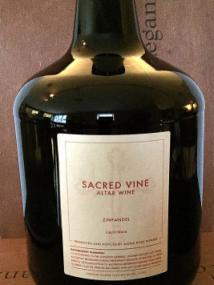

Q. 1. What is the purpose of the "Altar wine?"
A. 1. The "Altar wine", also known as the Sacramental wine or Communion wine is wine obtained from grapes and intended for use in celebration of the Eucharist (referred to also as the Lord's Supper or Holy Communion, among other names). The same wine, if intended for use in ceremonies of non-Christian religions or for ordinary use, would not normally be described by these terms.
The majority of mainstream liturgical churches require that sacramental wine should be pure grape wine. In the Eastern Orthodox Church, for example, sacramental wine used in the Divine Liturgy must usually be fermented pure red grape wine, often sweet, though this is not required. Greek churches favour the use of Mavrodaphne or Nama, while Russian churches favour Kagor. Wines with additives, such as retsina, are not allowed.
It is not acceptable to substitute grape juice for wine.
In Eastern Christianity sacramental wine is usually red, to better symbolize its change from wine into the blood of Jesus Christ, as is believed to happen at the Eucharist.
In Western Christianity, white wine is also sometimes used for the practical purpose of avoiding stains on the altar cloths.
Over the centuries, various criteria were laid down for wine to be appropriate for use in the Eucharist. Editions of the Tridentine Roman Missal had a section De Defectibus on defects which could occur in the celebration of Mass, including defects of the wine. Canon 924 of the present Code of Canon Law (1983) states:
• §1 The most holy Sacrifice of the Eucharist must be celebrated in bread, and in wine to which a small quantity of water is to be added.
• §2 The bread must be wheaten only, and recently made, so that there is no danger of corruption.
• §3 The wine must be natural, made from grapes of the vine, and not corrupt.
This means that the wine must be naturally fermented with nothing added to it, and the wine itself cannot have soured or become vinegar, nor can it have anything artificial added to it (preservatives, flavours). Wines are made from Vitis vinifera grapes. While the Catholic Church generally adheres to the rule that all wine for sacramental use must be pure grape wine and alcoholic, it is accepted that there are some circumstances, where the priest is an alcoholic for example, where it may be necessary to use a wine that is only minimally fermented, called mustum.
[Source: https://en.wikipedia.org/wiki/Sacramental_wine]